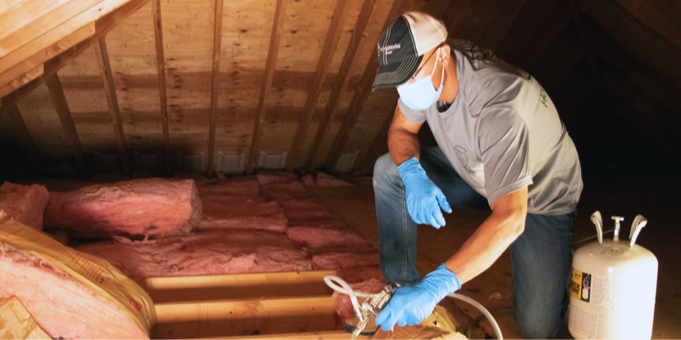Insulating and air sealing your home, also known as weatherizing, will save you money on heating and cooling costs, make your living space feel more comfortable, and can help you reduce greenhouse gas emissions.
Air leaks are one of the greatest sources of energy loss in a home, according to the National Renewable Energy Laboratory (NREL). Air sealing can prevent cold drafts coming in and heated air from leaking out your home through gaps, cracks, and holes.
During an energy assessment, auditors check the basement, attic, and in any crawlspaces and knee walls to ensure that openings are properly sealed.
Air sealing varies depending on the area of the house.
- Unfinished basements are sealed along the perimeter of the basement on a section called the rim joist where the walls meet the ceiling. Cold air enters from the bottom of the house, warms, rises, and escapes out of the attic. The rim joist is a connection point and naturally more vulnerable than a solid wall, making it an important place to target.
- In unfinished attic spaces, existing insulation is picked up and any electrical or ductwork penetrations and top plates are sealed where the walls connect with the ceiling. Sealing attic spaces helps prevent warm air from rising and escaping into the attic.
- Crawlspaces are air sealed along the perimeter while knee walls are sealed depending on what type of insulation currently exists in the home.
Air sealing can be likened to a windbreaker while insulation acts as a sweater. Separately, they both provide protection, but together they form a complete seal, offering ultimate protection for your home.
Sealing air leaks can save you 10%-20% on heating and cooling costs, according to NREL. Homeowners typically see a return on their investment in about a year due to money saved, according to the U.S. Department of Energy (DOE).
Newton residents who are eligible for a no-cost energy assessment can access 100% off the cost of air sealing. Sign up with Green Newton’s partner HomeWorks Energy, who can perform both the assessment and weatherization work.
We hope you enjoyed our spotlight series on insulation! Be sure to tune into Green Newton’s webinar this Thursday, March 3 at 7pm to learn more and ask any questions you might have.



Recently on Twitter